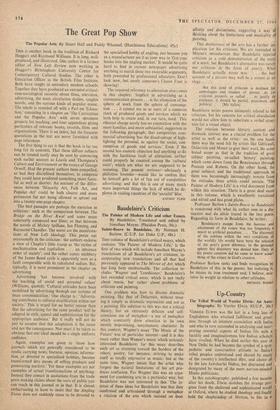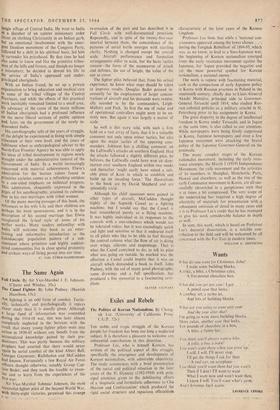Up-Country
The Tribal World of Vernier Elwin: An Auto- biography. By Verrier Elwin. (0.U.P., 30s.) VERRIER ELwIN was the last in a long line of Englishmen who attained fulfilment and great- ness through an intimate association with India, and who in turn succeeded in analysing and inter- preting essential aspects of Indian life with a lucidity and imaginativeness few Indian scholars have rivalled. When he died earlier this year in New Delhi he had become the symbol of a syrn' pathetic and constructive attitude to India's tribal peoples understood and shared by many of the country's intellectual elite, and above all by the late Jawaharlal Nehru, but distrusted and denigrated by many of the more narrow-minded Hindu politicians.
In this autobiography, published a few months after his death, Elwin sketches the strange pro- gress from the sheltered and sophisticated world at Oxford, where he studied theology and finally held the chaplainship of Merton, to life in a jungle village of Central India. He went to India as a Member of an austere missionary order intent on clothing Christianity in an Indian garb, but an emotional involvement with the emer- gent freedom movement of the Congress Party, followed by a shift in his spiritual basis, led him to surrender his priesthood. By that time he had also cotne to know and like the primitive tribes- men of the hills and forests, and though no longer a missionary, he decided to devote his life to the service of India's 'oppressed and under- Privileged aboriginals.
With an Indian friend, he set up a private organisation to bring education and medical care to some of the tribal villages of the Central Provinces, and while the effects of this' practical Work inevitably remained limited to a small area, his advocacy of the cause of the many millions of Indian aboriginals had a profound influence on the more liberal sections of public opinion and, later, on the government of the newly in- dependent India.
His autobiography tells of the years of struggle, of the delight he experienced in living with simple tribesmen at their own level, and the years of fulfilment when as anthropological adviser to the North-East Frontier Agency he was able to apply his ideas of tribal development to regions newly brought under the administrative control of the Government of India. In a world increasingly Concerned with material achievements, Elwin's admiration for the human values found in Primitive societies comes as a refreshing antidote to a one-sided emphasis on technical progress. This admiration, eloquently expressed in the Pages of his autobiography, attained its culmina- tion in his two marriages with tribal women.
Of the many moving passages of this book, the references to his wife Lila and their children are Perhaps the most spontaneous, and it is in the description of his second marriage that Elwin recaptured, the lyrical style of some of his earlier works. Many readers unfamiliar with India will welcome this book as an enter- taining and informative introduction to the kaleidoscopic population pattern of a sub- continent where primitive and highly sophisti- cated communities live in close spatial proximity and archaic ways of living persist into our time.
C. VON FORER-HAIMENDORF





























 Previous page
Previous page